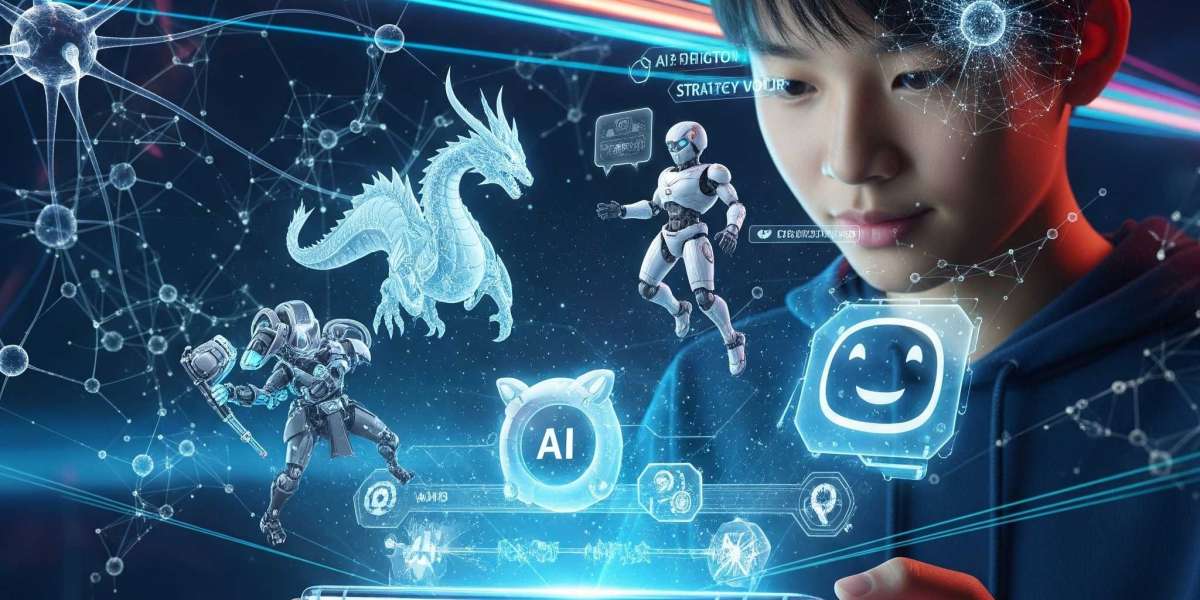The mobile gaming industry has experienced exponential growth over the past decade, with millions of players worldwide immersing themselves in their favorite games on smartphones and tablets. In 2025, one factor continues to shape this ever-evolving landscape: Artificial Intelligence (AI). AI has become the driving force behind a transformation in mobile game development, enhancing player experiences, enabling more complex and immersive gameplay, and fostering innovative app design. This blog examines how AI is revolutionizing mobile gaming in 2025 and how machine learning in apps is becoming a vital tool for both developers and players.
The Role of AI in Gaming
Artificial Intelligence in gaming is not a new concept. For years, AI has been used to create responsive, adaptive, and challenging virtual opponents. However, in 2025, its role has grown beyond traditional enemy bots. AI in gaming is now integral to nearly every aspect of mobile game development, from creating realistic environments to personalizing gameplay experiences based on individual player behaviors. AI enables games to understand, predict, and adapt to a player's actions and decisions, making the gaming experience more dynamic and engaging.
One of the most significant ways AI impacts mobile gaming is through its ability to learn from player interactions. Machine learning algorithms, a subset of AI, analyze a player's behaviors, preferences, and playstyles, then adjust the game's difficulty level, storylines, or even character interactions to ensure an enjoyable and unique experience. By tailoring the game to the player, AI helps keep the gameplay fresh and exciting, thus increasing player retention and satisfaction.
Enhancing Game Development with AI
Mobile game development has become more sophisticated in 2025, with AI assisting developers in ways that were previously unimaginable. AI is significantly improving game design, artwork generation, and programming, allowing developers to streamline production processes and create games that are not only visually stunning but also highly interactive.
1. AI-Generated Content
AI is making it easier for developers to create dynamic Content within games. Procedural generation, powered by AI, allows for the automatic creation of game worlds, levels, and storylines, making the gaming experience feel ever-expanding. This can lead to procedurally generated maps, randomized quest lines, and adaptive environments that respond to player choices.
For example, in 2025, open-world mobile games are utilizing AI to generate expansive worlds that adapt to the player's actions. Instead of manually designing every map, developers use AI to build procedurally generated landscapes, cities, dungeons, and missions. These environments are not only vast but also have meaningful interactions with the player, creating a much richer gaming experience.
2. AI-Assisted Animation and Art Design
Creating visually stunning animations and game art requires a considerable amount of time and effort. Still, with AI tools like generative adversarial networks (GANs), game developers can generate lifelike animations and characters more efficiently. These AI tools can create detailed textures, facial animations, and realistic character movements, reducing the workload of artists and animators.
AI-powered art generation enables mobile game developers to explore a diverse range of visual styles, from hyper-realistic graphics to cartoonish, cel-shaded designs, without compromising the game's quality. With machine learning models analyzing previous artwork and refining designs, developers can now create immersive experiences for players, whether they're battling in a fantasy world or solving puzzles in a mysterious city.
3. Improved AI in NPCs
Non-playable characters (NPCs) are essential elements in any mobile game, as they significantly contribute to storytelling and interaction. In 2025, AI is enhancing NPC behavior, making these characters more innovative and more lifelike. By using machine learning algorithms, developers can create NPCs that respond dynamically to the player's actions, making them more convincing in role-playing and adventure games.
For example, NPCs can now adapt to the player's actions, providing a more personalized interaction. If the player consistently supports a particular faction or selects dialogue options that align with a specific morality, the NPCs can recognize these patterns and adjust their responses accordingly. This kind of adaptive behavior adds depth to the game world, as it makes the players' decisions feel more consequential.
Personalizing Mobile Games Through AI
In 2025, the mobile gaming market is moving toward hyper-personalized experiences. AI in gaming is a powerful tool for customizing games based on player preferences, skill levels, and engagement patterns. Here's how machine learning is influencing personalized gaming experiences.
1. Dynamic Difficulty Adjustment
AI is enabling dynamic difficulty adjustment (DDA), which allows mobile games to adapt in real-time to a player's ability level. Rather than offering a fixed difficulty setting, AI in gaming can monitor a player's performance and adjust the game's challenge accordingly based on the player's level of success. If the player is breezing through levels, the game will become harder. Conversely, if the player is struggling, the game can assist in the form of easier challenges or hints.
DDA helps ensure that players stay engaged without feeling overwhelmed or bored, maintaining an optimal balance of challenge and enjoyment. This leads to better player retention, as the game feels rewarding and achievable while still providing excitement.
2. AI-Driven Personalization
Machine learning algorithms are also helping to personalize the overall gaming experience. By analyzing a player's playstyle, choices, and preferences, AI can customize in-game elements, such as character customization options, gameplay paths, and even story arcs. This personalization adds a layer of uniqueness to every player's journey, making the game feel like a custom-tailored experience.
For instance, if a player frequently chooses stealth-based playstyles, the game might offer special abilities or tools that align with this preference, ensuring the player has an enjoyable experience without needing to alter their approach. The personalization extends to rewards and progression systems, where AI can suggest or unlock Content based on a player's interests or past behavior.
AI in Game Monetization
As mobile gaming has become a significant industry, monetization strategies have evolved. AI is making these strategies more effective by providing developers with the tools to analyze user behavior, predict spending habits, and tailor in-app purchases to individual players. In 2025, mobile game monetization is becoming increasingly intuitive, thanks to the application of machine learning.
1. Targeted In-App Purchases
AI-driven algorithms track a player's behavior within the game and use this data to suggest personalized in-app purchases. By analyzing how players interact with the game, developers can provide targeted offers that resonate with each player, such as virtual goods or power-ups that enhance their progress.
These targeted purchases are less intrusive and more appealing to players, as they feel like a natural extension of their gameplay experience. By offering the right items at the right time, developers can significantly boost their revenue while still maintaining a positive player experience.
2. Optimized Ad Placement
Mobile games frequently rely on ads for revenue. With AI, developers can optimize ad placement by learning which moments in the game are most suitable for showing ads. By analyzing player behavior and gameplay sequences, AI can determine when a player is most likely to engage with ads and when they are likely to be distracted. This leads to higher click-through rates and better user engagement with ads, ultimately improving revenue generation for developers.
Read More :- Mastering Rummy Game Success Through UI/UX Design Magic
The Future of Mobile Gaming with AI
Looking ahead, the future of mobile gaming with AI is exciting and full of potential. As AI technologies continue to advance, we can expect even more sophisticated AI-driven experiences in mobile games. With innovations like virtual reality (VR) and augmented reality (AR) on the horizon, AI will play an even larger role in shaping the immersive worlds of tomorrow's mobile games.
AI-powered virtual assistants could become a part of mobile games, guiding players through tutorials, offering real-time advice, and even acting as companions in story-driven games. These virtual assistants will utilize natural language processing (NLP) to comprehend player queries and deliver relevant, personalized responses. Additionally, as mobile devices continue to evolve with improved hardware, AI's ability to process large datasets in real-time will further enhance the gaming experience.
Conclusion
AI is already transforming the mobile gaming landscape, and by 2025, it will have become an indispensable tool for both game developers and players. From AI-driven procedural content generation to personalized experiences that adapt in real-time, artificial Intelligence is making games more innovative, more engaging, and more enjoyable. As AI continues to evolve, the possibilities for mobile game development and player experiences are boundless. Whether you're a developer looking to create the next big hit or a player immersing yourself in these groundbreaking games, AI is undeniably shaping the future of mobile gaming.


